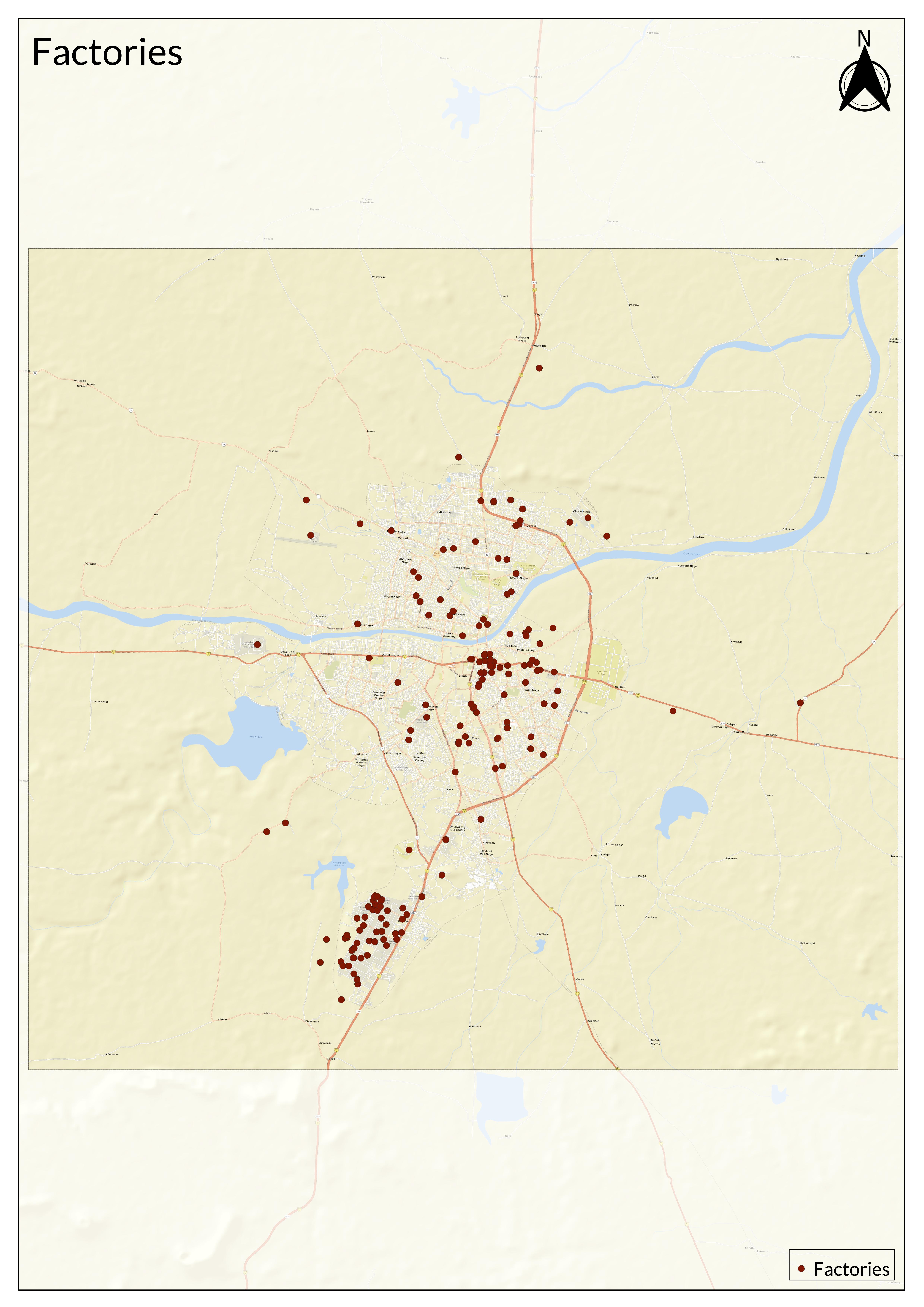Contents
- Main Industries
- Edible Oil
- Textile
- Agro-based
- Dairy
- Prominent Local Industries/Cottage Industries
- Gur and Khandsari Production
- Cane and Bamboo Working
- Cart-Making
- Carpentry
- Brick-Making
- Pottery
- Hand-Made Paper Industry
- Influential Families and Their Businesses
- Graphs
- A. Number of Establishments
- B. Social Group of Establishment Owner
- C. Sources of Finance
- D. Sources of Borrowings and Financial Assistance
- E. Government Establishments and PSUs
- F. Cooperatives
- G. Private Sector Establishments
- H. Religion of Establishment Owner
- I. Night-Time Lights
- J. MSME Industries
- K. Number of Factory Workers in Registered Factories
- L. Industrial Power Consumption
- M. Pollution Categories
- N. Broad Activities Establishments are Engaged In
- Sources
DHULE
Industry
Last updated on 6 November 2025. Help us improve the information on this page by clicking on suggest edits or writing to us.
Today, Dhule is recognized for its edible oil production, power-loom sector, and agro-processing industries. The establishment of the Nardana Textile Park marks a significant step in expanding industrial activity. Despite limitations such as water scarcity and a lack of mineral resources, the district’s economy continues to grow, with industries evolving alongside advancements in agriculture and trade.

Main Industries
Edible Oil
Dhule is one of Maharashtra's major edible oil producers, benefiting from fertile soil and a suitable climate for oilseed crops like groundnut and sesame. The district has a well-developed processing infrastructure with numerous oil mills and refining units.
Textile
Dhule is known for its thriving power-loom sector, one of the largest in Maharashtra, supported by the local cotton industry. This sector produces a variety of textiles, including sarees and traditional garments.
A key development in this industry is the Nardana Textile Park, located about 30 km from Dhule city. Spread across 648 hectares, the park is designed to strengthen textile manufacturing with modern infrastructure and 72 dedicated plots for various enterprises, encouraging industrial growth and investment.
Agro-based
The agro-based industries primarily revolve around the processing of local agricultural products. Key activities include oil extraction, particularly from groundnuts and sesame seeds, which positions Dhule as one of the leading producers of edible oil in the state, especially de-oiled cakes (a byproduct of oilseed processing).
Additionally, the district is known for its cotton ginning and pressing, which supports the textile sector. Other notable agro-based enterprises include dal mills and various small-scale processing units that handle crops like jowar, bajra, and sugarcane.
Dairy
In terms of the dairy industry, Dhule is renowned for its high-quality milk and ghee production. The region's dairy farms benefit from a favorable climate and rich cattle feed derived from cotton by-products, which enhances milk quality. Prominent dairy cooperatives, such as the Dhule District Cooperative Milk Producers Union, play an essential role in collecting, processing, and marketing milk and dairy products
Prominent Local Industries/Cottage Industries
The 1974 Dhulia (now Dhule) Gazetteer also states that cottage industries were crucial for Dhule’s economy, offering jobs to different communities.
Some of the cottage industries in Dhule included:
Gur and Khandsari Production
The district had a thriving gur and khandsari industry, particularly in Shahada and Sakri, where 71 factories operated in 1961.
Cane and Bamboo Working
Artisans from the Burud community were engaged in cane and bamboo crafts, particularly in Akrani, Nawapur, and Shehi. The availability of high-quality bamboo in the forests of Akrani and Nawapur ranges supported this industry, which provided essential products for daily use.
Cart-Making
Dhule was known for its cart-making industry, concentrated in Dondaicha, Taloda, Chopda, and Navapur. Skilled artisans, mainly Desi and Pardeshi Sutars, manufactured durable carts, with local blacksmiths supplying the iron components. These carts gained popularity due to their improved design and affordability.
Carpentry
Carpentry was widespread, with Sutar artisans engaged in the construction of agricultural tools, furniture, and carts. Carpenters in Dhule, Chopda, Taloda, and Pimpalner were particularly well-known for their craftsmanship. The demand for their services increased with the rise in construction and infrastructure projects.
Brick-Making
Brick production was a seasonal occupation, catering to local construction needs. Important centers for this industry included Dhule, Nandurbar, Shahada, and Sakri.
Pottery
Pottery-making was primarily practiced by the Kumbhar community, who produced essential household items such as water pots, jars, and tiles. Dhule, Nandurbar, and Shahada were major centers, with the Savda potters particularly known for their skill in coloring pottery using lac-based dyes.
Hand-Made Paper Industry
A hand-made paper unit was started in Khandbara in 1961, supported by the Khadi and Village Industries Commission. It utilized waste paper, rags, and chemicals to manufacture paper.
Influential Families and Their Businesses
Dhule has been shaped by several influential families who have played a significant role in politics and business. These families have contributed to sectors such as education, agriculture, cooperatives, and industry, leaving a lasting impact on the district. Some of the most notable among them include the Faruqui, Vinchurkar, Rawal, Patil, Randhir, and Patel families.
Graphs
Sources
Environment Department, Government of Maharashtra and Maharashtra Pollution Control Board. June 23, 2021. Dhule District Environment Plan. Environment Department, Government of Maharashtra and Maharashtra Pollution Control Board.https://mpcb.gov.in/sites/default/files/envi…
Maharashtra State Government. Cottage Industries from Dhulia District Gazetteer. gazetteers.maharashtra.gov.in, Dhulia District, Maharashtra.https://gazetteers.maharashtra.gov.in/cultur…
Last updated on 6 November 2025. Help us improve the information on this page by clicking on suggest edits or writing to us.